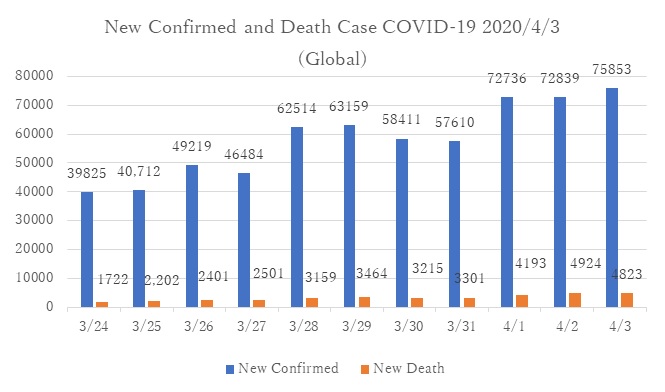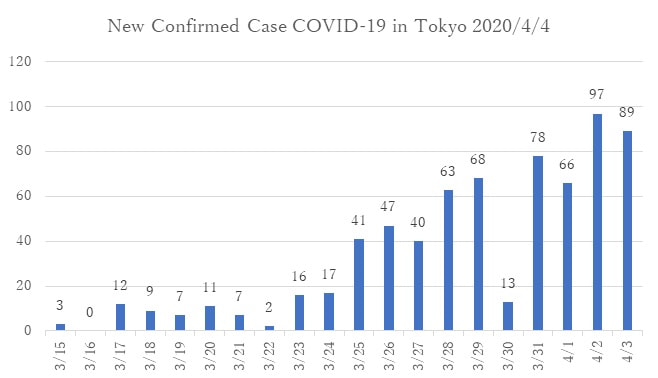SHARE
Services for the Health in Asian & African Regions (SHARE) = SHARE is a citizen sector organization (NGO) that engages in international cooperation mainly through providing health service.
HOME > News > Information of COVID-19(2)
- 【※updated】COVID-19(multi-language)
- Information of COVID-19(15)
- Information of COVID-19(vaccines)
- 《Request to the Government of Japan》Ease the protection of intellectual property rights and promote sharing and cooperating on pharmaceuticals and medical technologies, in order to accelerate efforts to overcome COVID-19 all over the world.
- Information of COVID-19(14)
- Information of COVID-19(13)
- Information of COVID-19(12)
- Information of COVID-19(11)
- SHARE Medical Information Line for Migrants is resumed in Oct.
- Information of COVID-19(10)
Information of COVID-19(2)

Information of COVID-19 (2)by SHARE 2020.04.06
1.Global and Japanese Situation of COVID-19
Number of the new confirmed Case■WHO Coronavirus disease 2019 (COVID-19) Situation Report 2020/4/3

■Tokyo 2020/04/04: Tokyo Prefecture Report

•The number of new confirmed cases is gradually increasing. Clusters at health felicities have been confirmed. Health officials concerned the explosive outbreak.
2.Clinical conditions of the Coronavirus disease (COVID-19): Why the COVID-19 patients become critically ill and die in a short period?
While most people with COVID-19 develop only mild or uncomplicated illness, approximately 14% develop severe disease (WHO, 2020). Mr. Ken Shimura, well known Japanese comedian, had severe pneumonia at four days of onset. Although he received mechanical ventilation and extracorporeal membrane oxygenation at the Intensive Care Unit (ICU), he lost consciousness and deceased.The case report from Seattle, USA (Bhatraju et al., 2020), and Wuhan, China (Guan et al., 2020)
- • Senior citizens and people with chronic medical conditions (e.g., diabetes mellitus, chronic kidney diseases, and asthma) were common in the critically ill population.
- • COVID-19 patients become a critically ill in a short period. Of the 24 patients, 12 patients have died on average of 7.5 days at the ICU in Seattle. Patients had respiratory failure leading to hypotension (i.e., low blood pressure). /li>
- • COVID-19 can be complicated by the acute respiratory distress syndrome (ARDS), sepsis and septic shock, multiorgan failure, including acute kidney injury and cardiac injury (WHO, 2020).
- • Among the COVID-19 patients, lymphocytopenia (an abnormally small number of lymphocytes) was common in both cases in Seattle and Wuhan. It may cause acute immune deficiency.
3.Mechanical ventilation and extracorporeal membrane oxygenation (ECMO)
Gas exchange is the delivery of oxygen from the lungs to the bloodstream, and the elimination of carbon dioxide from the bloodstream to the lungs.- Mechanical ventilation is also called a ventilator, respirator, or breathing machine. The ventilator pushes a mixture of air and oxygen into the patient's lungs to get oxygen into the body.
- Extracorporeal membrane oxygenation (ECMO) is a treatment uses a pump to circulate blood through an artificial lung back into the bloodstream. Acute respiratory distress syndrome causes cardiac injury. Therefore, patient in critical conditions needs the life-support with ECMO. These advanced medical therapies require extensive trainings for medical professionals (i.e., physician, nurses, biomedical medical equipment technician, etc.). Therefore, it is a matter of not only preparing medical equipment but also human resources.
4.Myth about COVID-19(WHO)
※The following information has no foundation- Exposing yourself to the sun or to temperatures higher than 25C degrees to prevent the coronavirus diseases (COVID-19).
- Although recovering from COVID-19, you will have the COVID-19 virus in the body for the life.
- Holding the breadth for 10 seconds or without coughing or feeling discomfort, you are free from the COVID-19.
- Drinking alcohol protect you against COVID-19.
- COVID-19 virus can be transmitted in hot and humid weather.
- Cold weather and snow kill the COVID-19 virus.
- Taking a hot bath prevent the COVID-19.
- COVID-19 can be transmitted by through mosquito bites.
- Hand dryers are effective in killing the COVID-19 virus.
- Ultraviolet disinfection lamp (UV lamp) kill the COVID-19 virus.
- Spraying alcohol or chlorine all over your body kill the COVID-19 virus.
- Rinsing your nose with saline help prevent infection with the COVID-19 virus.
- Eating garlic help prevent infection with the COVID-19 virus.
- Antibiotics are effective in preventing and treating the COVID-19.
Reference:
1.Covid-19 in Critically Ill Patients in the Seattle Region -- Case Series
https://www.nejm.org/doi/full/10.1056/NEJMoa2004500?query=featured_coronavirus
2.Clinical characteristics of 2019 novel coronavirus infection in China
https://www.medrxiv.org/content/10.1101/2020.02.06.20020974v1
3.Clinical management of severe acute respiratory infection(SARI) when COVID-19 disease is suspected
https://www.who.int/docs/default-source/coronaviruse/clinical-management-of-novel-cov.pdf
4.COVID-19 is an emerging, rapidly evolving situation
https://medlineplus.gov/ency/anatomyvideos/000059.htm
https://medlineplus.gov/ency/article/007234.htm
5.American Thoracic Society
https://www.thoracic.org/patients/patient-resources/resources/mechanical-ventilation.pdf
6. Coronavirus disease (COVID-19) advice for the public: Myth busters (WHO)
https://www.who.int/emergencies/diseases/novel-coronavirus-2019/advice-for-public/myth-busters
Written by Nakasa and Koto
■English Information
-
Information of COVID-19(1)(ENGLISH)
-
Information of COVID-19(2)(ENGLISH)
-
Information of COVID-19(3)(ENGLISH)
-
Information of COVID-19(4)(ENGLISH)
-
Information of COVID-19(5)(ENGLISH)
-
Information of COVID-19(6)(ENGLISH)
-
Information of COVID-19(7)(ENGLISH)
-
Information of COVID-19(8)(ENGLISH)
-
Information of COVID-19(9)(ENGLISH)
■Useful URLs by multi-languages




